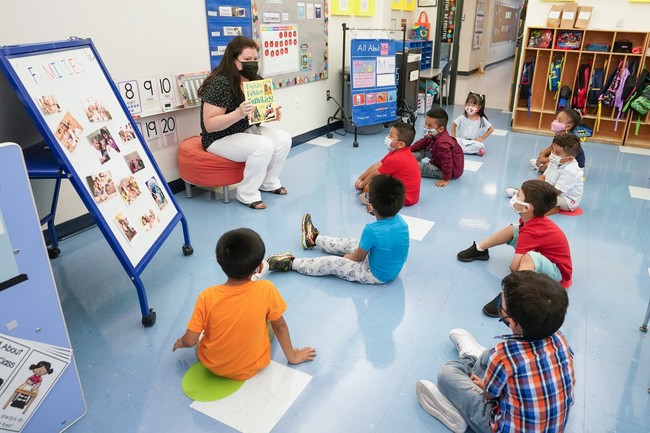
The Texas House of Representatives passed a $7.7 billion education funding bill on Thursday that contained a $1 billion plan to create “education savings accounts” that Texas families could use to pay for tuition at private schools as well as other school-related expenses, like “textbooks, transportation and therapy,” according to the Texas Tribune.
Texas is the last Republican-led state to adopt a school choice program. Republicans in Washington are now eying a national bill that would make all states adopt school choice for all students.
“It’s a monumental and cascading moment for the school choice movement,” said Tommy Schultz, chief executive of the American Federation for Children, a private-school choice advocacy group.
Two Republicans joined every Democrat in opposing the voucher bill. The outcome is the result of some hardball politics by Gov. Greg Abbott, who lost on the issue in 2023. Abbott vowed to primary Republican members who opposed vouchers, and six of eight voucher foes lost their primaries last March.
With his voucher majority assured, Abbott had to surmount the fierce resistance of Democrats and their teachers’ union backers. The Democrats offered to have the issue settled in a statewide ballot measure in November. Only one Republican, Rep. Dade Phelan of Beaumont, the former House speaker, voted for the ballot initiative. Phelan was deposed as speaker for his opposition to Abbott’s school choice bill in 2023.
The ballot initiative’s defeat assured passage of school choice.
The national school choice bill is near the top of the agenda for Republicans in the House.
A national bill would bring private-school choice to states where Democrats and teachers’ unions have always been successful in quashing the concept, contending that vouchers could drain resources from public education, diminish learning standards and leave the most disadvantaged children warehoused in poorly funded public schools.
The federal legislation is structured as a $10 billion tax credit for donations to nonprofit groups that offer private-education scholarships, and as such, it could be included as part of a giant budget reconciliation bill expected to be assembled this summer. If so, it would need only 51 votes in a Senate where Republicans hold 53 seats.
The scholarships would be made available to students as a voucher. A vast majority of families could be eligible, based on their household incomes not exceeding 300 percent of their area’s median income — over $300,000 per year in some regions.
The Texas House must now work out differences in school choice legislation between the House and Senate, a task not expected to be difficult.
Recommended: Lexington and Concord: 250 Years Later
Nationally, school choice has never been more popular, Not just vouchers, but also homeschooling, charter schools, private schools, and programs like education savings accounts. The momentum is building for a bill that would give parents in every state options besides failing public schools.
“We must empower parents with more options, acknowledging they have the final say in what educational setting is best for their children,” Rep. Adrian Smith (R–Neb.), a co-sponsor of the Educational Choice for Children Act (ECCA), which is now being considered by Congress.
“ECCA will benefit public, private, and homeschool students and increase the quality of education in our country,” he said when introducing the bill in January.
To that end, the bill would “amend the Internal Revenue Code of 1986 to allow a credit against tax for charitable donations to nonprofit organizations providing education scholarships to qualified elementary and secondary students.” Donations would be capped to the greater of $5,000 or 10 percent of the adjusted gross income of an individual taxpayer, or 5 percent of a corporation’s taxable income. Students could benefit from scholarships funded by the tax credit if they are eligible to attend a public elementary or secondary school and come from a household “with an income which is not greater than 300 percent of the area median gross income.”
There’s more to it than that, but the bill would allow taxpayers to divert some of the money they would otherwise pay to the federal government in the form of income taxes to instead be productively used to help kids escape the public schools. Such arrangements are popular in a number of states.
ECCA funds would be capped at $10 billion, with 90% distributed to scholarship organizations and 10% to the states. Up to 90% of school-age kids would be eligible.
“If ECCA is implemented successfully, millions more students could benefit from a choice program. ECCA might even open the door to educational freedom in states that have historically kept it shut,” write Cooper Conway and Colyn Ritter in EdChoice.
Make no mistake, the forces arrayed against passage of any school choice legislation in Congress are formidable. The teachers’ unions see this issue as the greatest threat to their power ever. They will not sit back and allow the passage of school choice without an epic battle.
Your favorite PJ Media writers are working hard to bring you the best opinions and news in the business. Support us by becoming a VIP Member! We’re giving you a 60% discount on the regular VIP Membership with the promo code “FIGHT.” Click here to join and receive your discount.

















